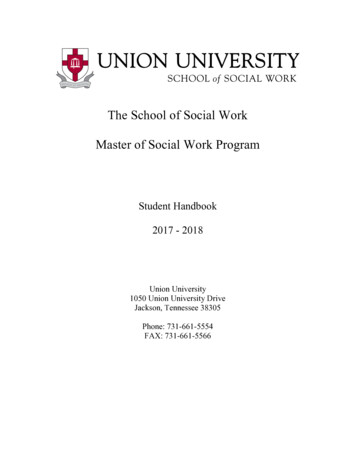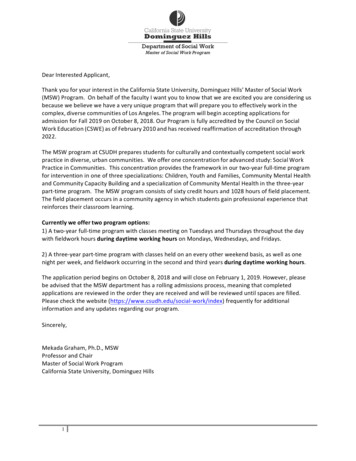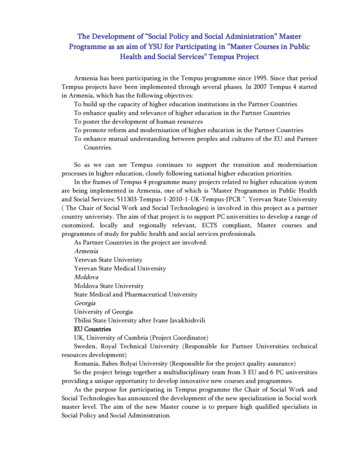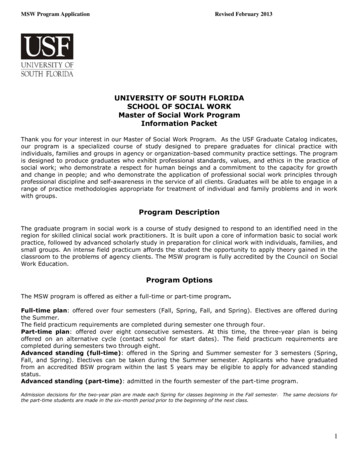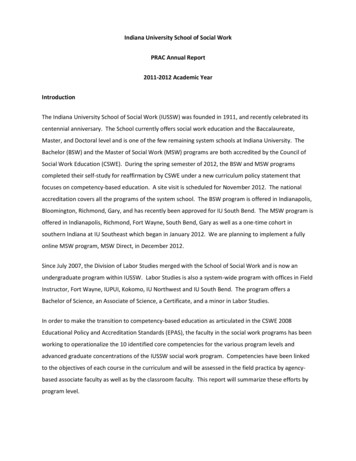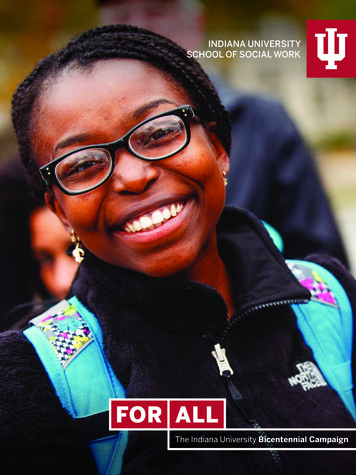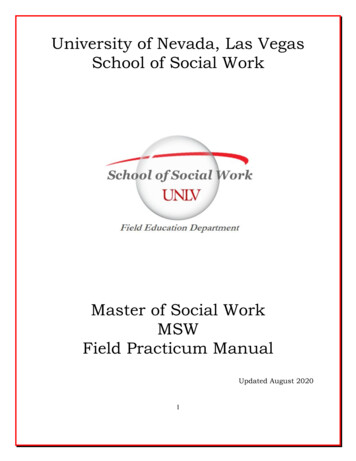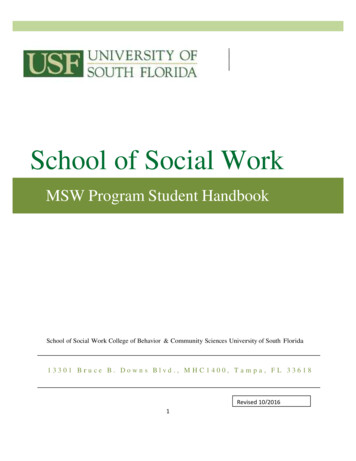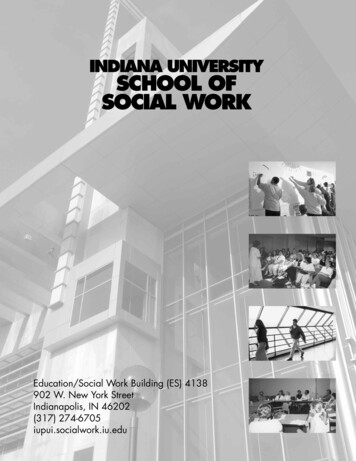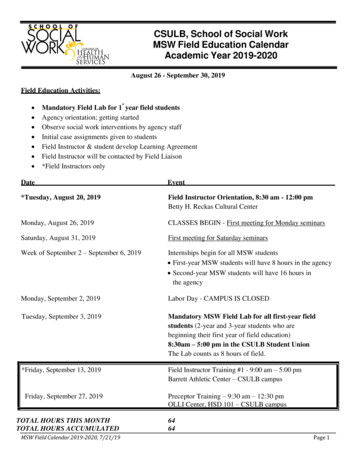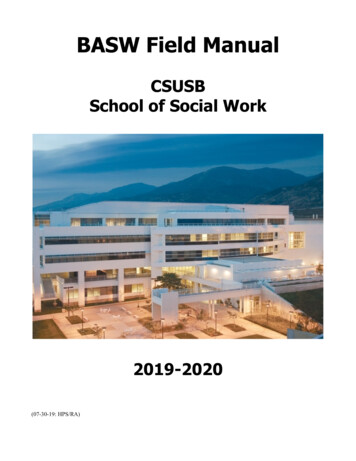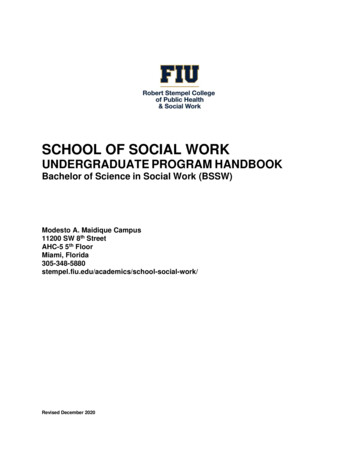
Transcription
SCHOOL OF SOCIAL WORKUNDERGRADUATE PROGRAM HANDBOOKBachelor of Science in Social Work (BSSW)Modesto A. Maidique Campus11200 SW 8th StreetAHC-5 5th FloorMiami, l-social-work/Revised December 2020
TABLE OF CONTENTSBSSW PROGRAM MISSION STATEMENTAdministrationFaculty Holding University Administrative AppointmentsAdministrative StaffFacultyI.FLORIDA INTERNATIONAL UNIVERSITYII.ROBERT STEMPEL COLLEGE OF PUBLIC HEALTH &SOCIAL WORKIII.SCHOOL OF SOCIAL WORKIV.SOCIAL WORK AS A PROFESSIONV.UNDERGRADUATE SOCIAL WORK PROGRAMVI.BSSW PROGRAM GOALSVII. CORE COMPETENCIES AND CORRESPONDINGPRACTICE BEHAVIORSVIII. ADMISSIONA. RequirementsB. ProceduresIX.DEGREE REQUIREMENTS BACHELOR OF SCIENCEIN SOCIAL WORKA. General RequirementsB. Course Requirements1. Required Upper-Division Courses for Social Work2. Courses in Other Departments3. Professional E-Portfolio4. Certificate in Child Welfare PracticeX.FIELD EDUCATIONA. Pre-Requisite RequirementsB. Course RequirementsXI.OUTCOME MEASURESXII. THE PROFESSIONAL SOCIAL WORK E-PORTFOLIOXIII. GRADES AND RECORDSA. Dean's ListB. Academic Warning, Probation and DismissalC. Final ExaminationsXIV. ADVISEMENTXV. CRITERIA FOR EVALUATION OF ACADEMIC & PROFESSIONALPERFORMANCEEthical Community Membership1. Academic Performance & Misconduct2. Professional PerformanceProfessional Development Assessment RubricCriteria for Professional Misconduct ReviewXVI. STUDENT PROFESSIONAL & ACADEMIC 7172020202121212222222223232425
XVII.XVIII.XIX.XX.XXI.XXII.A. Professional Misconduct Procedures1. The ProcessB. Academic Performance & Misconduct ProceduresC. Student Review & Termination Committee MembershipD. Reinstatement After TerminationACADEMIC & PROFESSIONAL PERFORMANCE GRIEVANCEPROCEDURESA. Academic GrievancesB. Professional Performance GrievancesSTUDENT ORGANIZATIONSDISABILITY SERVICESLIBRARYGRADUATION CHECK AND APPLICATION FORGRADUATIONCAREER PLANNINGA. Graduate StudyB. APPENDIX A Pre-requisites and co-requisites for required social work coursesAPPENDIX B Social Work Student ContractAPPENDIX C BSSW Student Exit SurveyAPPENDIX D Affiliated AgenciesAPPENDIX E FIU University Core CurriculumAPPENDIX F Professional Development Assessment RubricAPPENDIX G Useful WebsitesAPPENDIX H Contact InformationAPPENDIX I References353739465055596061
BSSW PROGRAM MISSION STATEMENTAs a vital, contributing member of the South Florida community, theundergraduate social work program is committed to preparing itsstudents for generalist practice in diverse, urban communities, locallyand globally with an emphasis on understanding and serving individuals,families, groups, organizations and communities. Grounded in theprofessional social work values and ethics, the program educatesstudents with skills and knowledge based on scientific inquiry andcollaborative engagement to promote human and community well-being.
AdministrationMary Helen Hayden, Ed.D, LCSW, DCSWDirector and MSW CoordinatorFlorida International UniversityJennifer Abeloff, MSW, MSAssociate Director and BSSW CoordinatorClinical Assistant ProfessorWashington University in St. LouisRichard Beaulaurier, Ph.D., MSWPh.D. Coordinator and Associate ProfessorUniversity of Southern CaliforniaFaculty Holding University Administrative AppointmentsAndres G. Gil, Ph.D., MSWProfessor and Vice President for ResearchUniversity of MiamiRosa Jones, DSW, LCSWFounding Professor and Vice-President Emeritus for Student AffairsHoward UniversityAdministrative StaffJessica ArguelloProgram CoordinatorOffice of FieldEducationMaria GutierrezOffice ManagerSheila Jenkins-Boone, MSWAcademic Advisor—UndergraduateZenaida PirriAdministrativeAssistantGladys RamosProgram AssistantKelly Sydnor, MSWStudent Services Coordinator
FacultyShedrick Boren, Ph.D., MSWClinical Assistant ProfessorUniversity of MiamiShanna Burke, Ph.D., MSWAssistant ProfessorSimmons CollegeMario De La Rosa, Ph.D., MSWProfessor, Director CRUSADAOhio State UniversityElise Linder, MSW, LCSWClinical Assistant Professor andMSW Field Education CoordinatorUniversity of GeorgiaMark Macgowan, Ph.D., LCSWAssociate Dean and ProfessorBarry UniversityIvania Delgado, Psy.D., MSWAssistant Teaching ProfessorCarlos Albizu UniversityLourdes Martin, MSW, LCSWClinical Assistant Professor and GreenFamily Foundation NeighborhoodHELPTMSocial Work SupervisorFlorida International UniversityBeatrice Farnsworth, MSW, LCSWAssistant Teaching Professor and GreenFamily FoundationNeighborhoodHELPTMNew York UniversityMiriam Potocky, Ph.D., MSWProfessorUniversity of KansasNicole Fava, Ph.D., MSWAssistant ProfessorUniversity at BuffaloNatalia Giordano, MSW, LCSWAssistant Teaching ProfessorFordham UniversityVictoria Gray, MSW, LCSWAssistant Teaching ProfessorFlorida International UniversityHui Huang, Ph.D., MSWAssociate ProfessorUniversity of IllinoisDavid Saltman, MSW, LCSWAssistant Teaching ProfessorRutgers UniversityAmethyst St. Thomas, MSW, LCSWVisiting Assistant Teaching Professor andBSSW Field CoordinatorBarry UniversityEric Wagner, Ph.D.Professor, Director FIU-CBRIUniversity of Pittsburgh
I. FLORIDA INTERNATIONAL UNIVERSITYFlorida International University is a comprehensive, multi-campus urban research institution whichis committed to providing both excellence and access to all qualified students desiring to pursuehigher education. The University was established by the Florida State Legislature on June 22, 1965.It is a member Institution of the State University System of Florida. Classes began at the UniversityPark Campus on September 19, 1972, with an initial enrollment of almost 6,000 upper-levelundergraduate and graduate students. The Biscayne Bay Campus in North Miami opened in 1977.In July 1981, the Legislature funded the University to become a four-year institution and in August,1981, the first freshman class was admitted. In 2014, the enrollment grew to over 54,000 students.II. ROBERT STEMPEL COLLEGE OF PUBLIC HEALTH & SOCIAL WORKThe School of Social Work is housed within the Robert Stempel College of Public Health &Social Work, accredited by the Council on Education for Public Health (CEPH). StempelCollege is unique among the nation’s accredited schools of public health in its interdisciplinarystructure which combines the five major disciplines of public health in partnership with thedisciplines of nutrition, dietetics and social work. This special blend of disciplines and programsafford students with the opportunity to better explore and understand the interrelatedness ofsocial, biological, environmental and cultural determinates of health and well-being. TheRSCPHSW strongly strives to reflect the diversity of the greater community so as to maximizeits understanding and effectiveness in providing cross-cultural health and mental health servicesin today’s heterogeneous mix of cultures and languages. All students in the College are requiredto be grounded in basic public health knowledge.III. SCHOOL OF SOCIAL WORKThe Social Work Program was established in 1972, when the University began offeringacademic programs. The School offers undergraduate and graduate studies leading to thebachelor's (BSSW) and master's (MSW) degrees in Social Work and offers a Doctor ofPhilosophy (Ph.D.) in Social Welfare. The BSSW program was one of the first degree programofferings in the University. The BSSW program has been accredited since July 1974 by theCouncil on Social Work Education (CSWE). The MSW degree program has been offered sinceAugust 1981 and received full accreditation status in April 1986 by CSWE. The School islocated on the Modesto A. Maidique Campus.The School of Social Work offers programs of professional study which prepare graduates towork effectively in complex human service organizations. These organizations may be locatedin governmental and voluntary settings within the community, regional, state, and nationalsystems. Emphasis is placed on achieving a comprehensive, developmental, and communityoriented understanding of problems, issues, alternatives, and needs of an urban society facedwith rapidly changing social, political, economic and cultural conditions.Educational opportunities offered in the BSSW program are designed to prepare students for7
generalist social work practice working with individuals, families, groups, communities, andorganizations. The BSSW degree also prepares students for entrance into graduate schools ofsocial work and for participation in society as informed citizens.Many graduate schools of social work give advanced standing to students with a bachelor's degree inthe field. At FIU, qualified students with a BSSW degree may enter the graduate program withadvanced standing and complete their MSW program of study with a minimum of 31 credits.The program received full unconditional reaccreditation from the Council on Social WorkEducation, the national accrediting body, in the spring of 2016. The educational policy statementof the Council on Social Work Education can be accessed at www.cswe.org.IV. SOCIAL WORK AS A PROFESSIONSocial work is an action-oriented profession which challenges many thoughtful people who aresensitive to the complex problems facing individuals and communities in modern society. The socialwork student seeks to acquire both knowledge about man and society and skills in helping people usetheir own resources - individual, familial, community - in meeting their needs.Social workers are employed in a wide variety of public and voluntary community agencies welfare departments, family and children's agencies, group-serving agencies, hospitals, courts,community-development programs, housing authorities, etc. The holder of the bachelor's degree insocial work is eligible for many entry-level positions in such agencies.V. UNDERGRADUATE SOCIAL WORK PROGRAMThe undergraduate social work program offers an integrated educational experience that combinesthe theoretical and the practical. It is designed to prepare the student for beginning generalist practicein social work and for participation in society as an informed citizen.A typical student begins taking upper-division social work courses after having earned two years ofcollege credit (60 semester hours) and completes the social work degree requirements in twoadditional years of study, or the equivalent in part-time study. Upon completion of the program, thestudent receives the degree of Bachelor of Science in Social Work (BSSW).A full-time social work student is eligible for student membership in the National Association ofSocial Workers. A graduate may become a regular member of the Association. Students are alsoinvited to join the Student Social Work Association at the University and Phi Alpha Honor Society,the social work honor society.VI. BSSW PROGRAM GOALSThe goals of the undergraduate program are derived from the BSSW program mission statement andare consistent with CSWE’s Educational Policy.8
The goals of the BSSW Program are to:A. Provide curricula for generalist practice that build on a liberal arts foundation and the personand environment construct.B. Educate students of generalist practice to identify with the social work profession grounded inits history, values, and science and to recognize, support, and build on the strengths andresiliency of all human beings.C. Prepare students to engage, assess, intervene with, and evaluate diverse and multi-culturalindividuals, families, groups, organizations and communities in order to promote human andsocial well-being.D. Educate students to promote policies, services, and resource allocation in order to advocatefor human rights and social and economic justice.E. Prepare students to develop and use critical thinking and apply ethical principles in theirpractice.F. Provide students with the ability to engage in research-informed practice, collaborativeengagement, and be proactive in responding to the impact of context on professional practice.VII. CORE COMPETENCIES AND CORRESPONDING BEHAVIORS ANDDIMENSIONSThe core practice competencies are designated in the 2015 Educational Policy andAccreditation Standards (EPAS) by the Council on Social Work Education (CSWE). Thesecompetencies “describe the knowledge, values, skills, and cognitive and affective processesthat comprise the competency at the generalist level of competency.” CSWE has broken downthe competencies into 33 generalist behaviors, which “are observable components of thecompetencies” that integrate at least one of the four dimensions: values, skills, knowledge,and/or cognitive and affective processes.Competency 1—Demonstrate Ethical and Professional BehaviorBehaviors:1. Make ethical decisions by applying the standards of the NASW Code of Ethics,relevant laws and regulations, models for ethical decision-making, ethical conductof research, and additional codes of ethics as appropriate to context (Dimensions:skills, values, cognitive and affective processes);2. Use reflection and self-regulation to manage personal values and maintainprofessionalism in practice situations (Dimensions: skills, values, cognitive andaffective processes);3. Demonstrate professional demeanor in behavior; appearance; and oral, written, andelectronic communication (Dimensions: skills, values);4. Use technology ethically and appropriately to facilitate practice outcomes and(Dimensions: skills, values);9
5. Use supervision and consultation to guide professional judgment and behavior(Dimensions: skills, cognitive and affective processes).Competency 2—Engage Diversity and Difference in PracticeBehaviors:6. Apply and communicate understanding of the importance of diversity anddifference in shaping life experiences in practice at the micro, mezzo, and macrolevels (Dimensions: knowledge, skills, values);7. Present themselves as learners and engage clients and constituencies as expertsof their own experiences (Dimensions: knowledge, skills, values);8. Apply self-awareness and self-regulation to manage the influence of personalbiases and values in working with diverse clients and constituencies(Dimensions: skills, values, cognitive and affective processes);9. Recognize the extent to which a culture’s structures and values may oppress,marginalize, alienate, or create or enhance privilege and power.Competency 3—Advance Human Rights and Social, Economic, andEnvironmental JusticeBehaviors:10. Understand the forms and mechanism of oppression and discrimination(Dimensions: knowledge, skills, values);11. Apply their understanding of social, economic, and environmental justice toadvocate for human rights at the individual and system levels (Dimensions:knowledge, skills, values);12. Engage in practices that advance social, economic, and environmental justice(Dimensions: skills, values).Competency 4—Engage in Practice-Informed Research and Research-Informed Practice.Behaviors:13. Use practice experience and theory to inform scientific inquiry and research(Dimension; knowledge, skills);14. Apply critical thinking to engage in analysis of quantitative and qualitativeresearch methods and research findings (Dimensions: knowledge, skills);15. Use and translate research evidence to inform and improve practice, policy, andservice delivery (Dimensions: knowledge, skills).Competency 5—Engage in Policy Practice10
Behaviors:16. Identify social policy at the local, state, and federal level that impacts well-being,service delivery, and access to social services (Dimensions: knowledge);17. Assess how social welfare and economic policies impact the delivery of and accessto social services (Dimensions: knowledge);18. Apply critical thinking to analyze, formulate, and advocate for policies thatadvance human rights and social, economic, and environmental justice(Dimensions: knowledge, skills).Competency 6—Engage with Individuals, Families, Groups, Organizations, andCommunitiesBehaviors:19. Apply knowledge of human behavior and the social environment, person-inenvironment, and other multidisciplinary theoretical frameworks to engage withclients and constituencies (Dimensions: knowledge, skills);20. Use empathy, reflection, and interpersonal skills to effectively engage diverseclients and constituencies (Dimensions: skills, cognitive and affective processes).Competency 7—Assess Individuals, Families, Groups, Organizations, andCommunitiesBehaviors:21. Collect and organize data, and apply critical thinking to interpret information fromclients and constituencies (Dimensions: knowledge, skills);22. Apply knowledge of human behavior and the social environment, person-inenvironment, and other multidisciplinary theoretical frameworks in the analysis ofassessment data from clients and constituencies (Dimensions: knowledge, skills);23. Develop mutually agreed-on intervention goals and objectives based on thecritical assessment of strengths, needs, and challenges within clients andconstituencies (Dimensions: knowledge, skills, values);24. Select appropriate intervention strategies based on the assessment, researchknowledge, and values and preferences of clients and constituencies (Dimensions:knowledge, skills, values).Competencies 8—Intervene with Individuals, Families, Groups, Organizations,and Communities11
Behaviors:25. Critically choose and implement interventions to achieve practice goals andenhance capacities of clients and constituencies (Dimensions: knowledge, skills);26. Apply knowledge of human behavior and the social environment, person-inenvironment, and other multidisciplinary theoretical frameworks in interventionswith clients and constituencies (Dimensions: knowledge, skills);27. Use inter-professional collaboration as appropriate to achieve beneficial practiceoutcomes (Dimensions: skills);28. Negotiate, mediate, and advocate with and on behalf of diverse clients andconstituencies (Dimensions: knowledge, skills);29. Facilitate effective transitions and endings that advance mutually agreed-on goals(Dimensions: skills).Competency 9—Evaluate Practice with Individuals, Families, Groups,Organizations, and CommunitiesBehaviors:30. Select and use appropriate methods for evaluation of outcomes (Dimensions:skills);31. Apply knowledge of human behavior and the social environment, person-inenvironment, and other multidisciplinary theoretical frameworks in the evaluationof outcomes (Dimensions: knowledge, skills);32. Critically analyze, monitor, and evaluate intervention and program processes andoutcomes (Dimensions: knowledge, skills);33. Apply evaluation findings to improve practice effectiveness at the micro, mezzo,and macro levels (Dimensions: skills).VIII. ADMISSIONA. Requirements1. Students entering FIU as freshmen:Admissions criteria are the same as the general FIU criteria for freshmen.2. Student entering FIU as Transfer students with less than 60 earned, approved creditsAdmissions criteria are as follows: General FIU criteria for Transfer students with less than 60 earned, approved credits. Additional requirements specific to the School of Social Work: For admission with fewer than 30 credits, the School of Social Work also requiresstudents to have a minimum cumulative GPA of 2.5 in your college-level courses. For admission with less than 45 credits, the School of Social Work also requiresstudents to have a minimum cumulative GPA of 2.75 in your college-level courses12
and a “C” or higher in any pre-requisite taken (see below for list).For admission with 45-59 credits, the School of Social Work also requires studentsto meet the criteria listed below under # 3.3. Students transferring to FIU with 60 or more earned, approved creditsIn addition to the general FIU Transfer Admissions criteria for students with 60 credits ormore, the following criteria must be met:For admission with 60 or more credits, the School of Social Work requires students to havea minimum cumulative GPA of 2.75 in your college-level courses and have completed
Barry University Lourdes Martin, MSW, LCSW Clinical Assistant Professor and Green Family Foundation NeighborhoodHELPTM Social Work Supervisor Florida International University Miriam Potocky, Ph.D., MSW Professor University of Kansas David Saltman, MSW, LCSW Assistant Teaching Professor Rutgers University
